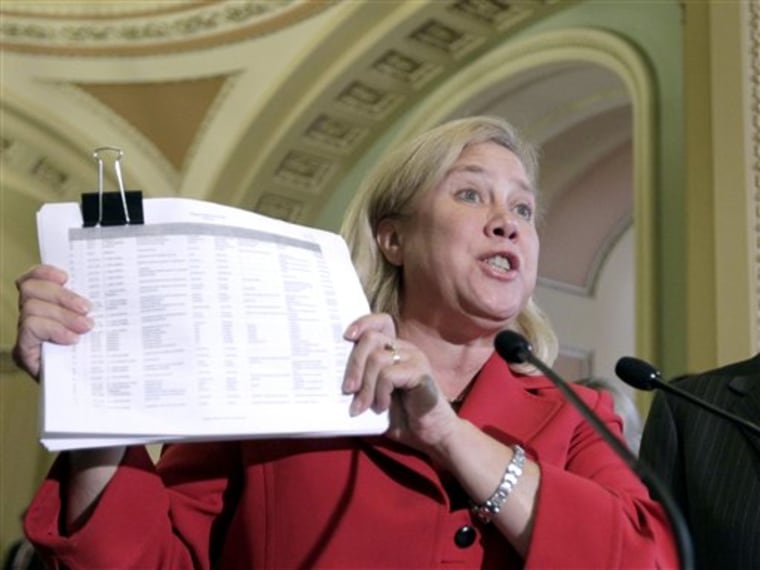An attempt in the GOP-controlled House to pass a disaster-relief measure as part of a bill to keep the federal government running past the end of the month failed Wednesday, a rebuke for the Republican leadership.
Such temporary extensions of government funding are the norm on Capitol Hill, but the extension failed on a 195-230 vote, in which 48 Republicans voted against the bill.
The outcome sends House Speaker John Boehner, R-Ohio, and his leadership team back to the drawing board as they seek to make sure the government doesn't shut down at the end of next week. It also raises the possibility that the government's main disaster relief program could run out of money early next week for victims of Hurricane Irene and other disasters.
Now House GOP leaders will need Democratic support to pass the bill. They can't make the bill more conservative and attract more GOP support because the amount of money that the government will spend this year was decided during the debt limit debate. It's a fixed number.
All but six House Democrats voted against the House GOP bill because they said it lacked enough FEMA funding and because it cut a $1.5 billion investment in green cars. This now gives some negotiating leverage to Democrats.
The Federal Emergency Management Agency has only a few days' worth of aid remaining in its disaster relief fund, lawmakers said Wednesday. The FEMA money would pay for the most urgently needed portion of the disaster aid that's required to avoid a cutoff in aid to victims of Hurricane Irene, recent Texas wildfires and Tropical Storm Lee.
The agency has already held up thousands of longer-term rebuilding projects — repairs to sewer systems, parks, roads and bridges, for example — to conserve money to provide emergency relief to victims of recent disasters.
The looming shortage has been apparent for months, and the Obama White House was slow to request additional money.
The underlying stopgap funding measure would finance the government through Nov. 18 to give lawmakers more time to try to reach agreement on the 12 unfinished spending bills needed to run government agencies for the 2012 budget year.
"They're going to pay for this bill. How? By ending a program that has created jobs," said Rep. Sander Levin, D-Mich. "It cuts it off, even though there are (loan) applications pending that will create thousands of more jobs in the manufacturing base of this country — In Indiana, Missouri, Ohio, California, Michigan and other states. It's inexcusable."
GOP leaders are also encountering opposition from tea party Republicans like Rep. Jeff Landry of Louisiana, who opposes the stopgap measure because it permits a higher spending rate than Republicans proposed last spring. The measure instead follows a hard-fought spending pact endorsed by GOP leaders and President Barack Obama.
In the Senate, the measure awaits a battle with Democrats. That fight involves how much disaster aid to provide and whether any of it should be paid for with offsetting spending cuts.
The House measure contains $1 billion in immediate aid for the 2011 budget year that's about to end and another $2.7 billion for the 2012 budget year beginning Oct. 1. The Senate measure totals $6.9 billion, with $804 million proposed for the last few days of fiscal 2011.
Senate Majority Leader Harry Reid, D-Nev., said that once the stopgap measure passes the House, he'll move to substitute the Senate's more generous aid package for the House's version. It will take at least seven Republicans to join with majority Democrats to win the 60 votes likely required to defeat GOP blocking tactics.
Ten Republicans voted with Reid last week to pass the stand-alone disaster aid measure, but their votes can't be taken for granted now. Tea party favorites like Sens. Marco Rubio, R-Fla., and Pat Toomey, R-Pa., were among those who voted with Reid last week, but they told reporters Wednesday that they'll instead support the partially paid-for House version.
If two more Senate Republicans switch, Reid would no longer have the 60 votes he needs.
In the House, Democrats rallied against the measure because of accompanying cuts to an Energy Department program that subsidizes low-interest loans to help car companies and parts manufacturers retool factories to build vehicles that will meet new, tougher fuel economy standards. These lawmakers include House Democratic Whip Steny Hoyer of Maryland and top Appropriations Committee Democrat Norm Dicks of Washington. Both had previously said they would support the measure.
Democrats say cutting the loan program could cost up to 10,000 jobs because there wouldn't be enough money for all pending applications.
Democrats say that $3.5 billion of loan subsidies has supported loans totaling $9.2 billion that created or saved 41,000 jobs in Tennessee, California, Indiana, Michigan, Delaware, Illinois, Kentucky, Missouri and Ohio. Ford Motor Co. and Nissan Motor Co. have already received loans; Chrysler Group LLC is awaiting final approval of a loan.
A protracted showdown could ultimately lead to a partial shutdown of the government when the budget year ends Sept. 30. That's unlikely, however.
Senate Minority Leader Mitch McConnell, R-Ky., predicted the conflict could be worked out in time for the Senate to make a Thursday night getaway to a weeklong recess. Such a scenario probably depends on Republicans prevailing.
"Congress always responds appropriately to disasters," McConnell said. "We're having a discussion about the appropriate way to do that, and I'm confident it will be resolved."
Reid, however, is spoiling for the battle. "We're not going to cave in on this," he said.
